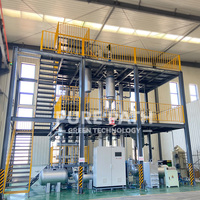From Crude to Smooth: Demystifying the Lube Oil Refining Proces
-
Lube oil, the lifeblood of our engines, goes through a remarkable transformation before reaching your car's crankcase. This journey, known as lube oil refining, is a complex dance of separation, purification, and blending, ensuring the smooth operation of countless machines. Let's delve into the key steps of this fascinating process:
- Crude Separation:
The journey begins with crude oil, a viscous mixture of hydrocarbons and impurities. The first stage involves atmospheric distillation. Imagine a giant teapot heating the crude oil. Lighter components like gasoline and diesel evaporate first, leaving behind heavier fractions destined for lube oil production.
- Deasphalting:
The remaining heavier fraction still contains undesirable asphaltenes, complex, tar-like substances. To remove them, the oil undergoes deasphalting. Think of it as a filtration process using solvents or propane, selectively capturing the asphaltenes while leaving the desired lube oil precursors behind.
- Vacuum Distillation:
The deasphalted oil, though cleaner, requires further separation. Enter vacuum distillation. Under reduced pressure, the oil is heated again, causing different lube oil "cuts" to evaporate at specific temperatures. Lighter cuts become viscosity modifiers, while heavier ones form the base oils for motor oil and other lubricants.
- Hydrotreating:
The lube oil cuts, though separated, still contain unwanted sulfur, nitrogen, and oxygen compounds. Hydrotreating uses hydrogen and a catalyst to remove these impurities, resulting in cleaner, more stable, and longer-lasting base oils.
- Blending and Additives:
The final stage involves blending different base oil cuts with specific additives. Think of it as customizing the oil's properties for its intended use. Antioxidants, friction modifiers, and pour point depressants are just some examples of these performance-enhancing additives.
- Quality Control and Packaging:
Before reaching your car, the finished lube oil undergoes rigorous quality control checks. Viscosity, flash point, and other critical parameters are meticulously measured to ensure the oil meets industry standards. Finally, the oil is packaged and shipped, ready to keep engines running smoothly for miles to come.
The Takeaway:
Lube oil refining is a multi-step process that transforms crude oil into the high-performance lubricants we rely on daily. By understanding this intricate journey, we gain a deeper appreciation for the engineering and science behind keeping our engines humming and our wheels turning.
Beyond the Basics:
The world of lube oil refining is constantly evolving, with advancements in green solvents, bio-based alternatives, and energy-efficient processes aimed at minimizing environmental impact and maximizing resource recovery. As we strive for a more sustainable future, the journey of lube oil continues to adapt and innovate, ensuring smooth operation not just for our engines, but for our planet as well.

